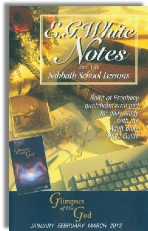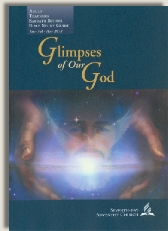|
||||||||||||||
Commentary on "The Triune God"
Day 3: Monday, January 2, 2012 - The Deity of Christ
Overview
Today's lesson discusses the Adventist understanding of the deity of Christ.
Observations
In the first paragraph, Christ's deity is defined as Him being “eternal and fully divine.” As we have seen from the first two days, the Adventist understanding of “fully divine” does not mean that Jesus Christ is fully (all of) God, but instead means that He is one of three equally divine eternal heavenly “dignitaries.” In other words, the Adventist “Jesus” is merely one third of “the Godhead”—“part” of, but not all of, “God.”
This meaning is made clear on page 13 of the Teachers Edition, where they say the following:
“Key Concept for Spiritual Growth: The Bible teaches the unity of God, but further study reveals that this unity is a dynamic relationship among three distinct Persons. […]
“The atom, that primal unity, was, in fact, a name for a complex relationship between the particles that composed it. The protons were not more 'atomic' than the electrons, or vice versa. If you were lacking either of them, you were lacking an atom.
“In the same way, the Old Testament of the Bible informs us that God is One. But as we look into this fact further, we discover that this unity is the product of a harmonious relationship among Three distinct Beings, all equally divine and all coeternal. While the atom can be, and has been (in contradiction to its name), split, this triune God really is the indivisible unity underlying all reality.”
So, in the Adventist worldview, Jesus is “fully divine” only in the sense that neither the Father nor Holy Spirit are “more” divine than Him, just as a proton is not more “atomic” than an electron. In other words, Jesus is merely one of three divine “parts” to “God.” They say that these “Three distinct Beings” (gods) are “all equally divine” and “all coeternal.”
But Jesus Christ is not just “part” of God—He is fully (all of) God (as is each person of the Trinity). There is only one true God, one indivisible divine Being. Colossians 2:9 says: “For in Him [Christ] all the fullness of Deity dwells in bodily form,” (NASB). Jesus Christ is the only true God. The Holy Spirit is the only true God. The Father is the only true God (John 17:3). How? Because there is only one indivisible divine Being (God). As Christian scholar Wayne Grudem puts it: “There are Three Distinct Persons, and the Being of Each Person is Equal to the Whole Being of God” (Bible Doctrine: Essential Teachings of the Christian Faith, page 120). But according to Adventism's belief in “Three distinct Beings, all equally divine” (Tritheism), John 17:3 could not possibly be true, or if accepted as it reads, a logical interpretation would require classifying Jesus and the Holy Spirit as false gods.
Notice also that in the above quotation, they say that God's “unity” and the fact that “God is One” is “the product of a harmonious relationship among Three distinct Beings.” In other words, “one God” is produced by “a harmonious relationship among Three distinct Beings”! They are thus admitting that if these “Three distinct Beings” decided to not have a “harmonious relationship” then there would actually be three gods (which is what “Three distinct Beings” actually means regardless of whether or not they get along with each other!). Getting along with each other really well cannot make three gods actually become one god!
Also, the final sentence in the quote from the Teachers Edition is very disingenuous: “While the atom can be, and has been (in contradiction to its name), split, this triune God really is the indivisible unity underlying all reality.”
Not only does Adventism teach that “the Godhead” was split when Jesus was on the cross, but they even teach that Jesus Christ ceased to exist when He died. This shows that in their theology, Jesus is not even a necessary “component” of “God.” They say that if you were lacking a proton or an electron, then you would be “lacking an atom.” But they say that even when Jesus supposedly ceased to be for three days and three nights, that we were not lacking a God. The Adventist “Jesus” is certainly “another Jesus” than the Jesus of the Bible (see 2 Corinthians 11:4).
In the fourth paragraph of today's lesson, the author states: “In Hebrews 1:8, 9, Christ’s divine nature is powerfully and explicitly expressed.” And the Easy Reading Edition defines “nature” as: “any of the qualities (ways of being) or aspects of God that make Him who He is, such as His love, mercy, goodness, forgiveness, holiness, power, and so on.”
Again, this shows that when they say that Christ is “fully divine” or speak of his “divine nature,” they are not defining the divine nature as God's actual substance or being, but instead are only talking about character traits such as love, mercy, etc. Thus, according to Adventism, any being that happens to have such love, holiness, power, etc., can be called “God.” This is not the orthodox definition of the divine nature. The divine nature is not just defined by a list of attributes, but by the fact that God is one infinite, indivisible and invisible divine spirit Being.
Summary
- The Adventist definition of the deity of Christ is closer to the Mormon definition than the Biblical definition. The Bible teaches that Jesus Christ is not just one third of “the Godhead” but is fully God—the one divine Being. “For in Him all the fullness of Deity dwells in bodily form,” (Colossians 2:9 NASB).
- The Adventist belief that God's “oneness” is “the product of a harmonious relationship among Three distinct Beings” is the heresy of anti-Trinitarian tritheism.
- The Adventist “Jesus” is not the historical and Biblical Jesus, who is the only true God, but is a false jesus who is thus not able to provide real salvation.
Copyright 2011 BibleStudiesForAdventists.com. All rights reserved. Revised December 29, 2011. This website is published by Life Assurance Ministries, Glendale, Arizona, USA, the publisher of Proclamation! Magazine. Contact email: BibleStudiesForAdventists@gmail.com.
The Sabbath School Bible Study Guide and the corresponding E.G. White Notes are published by Pacific Press Publishing Association, which is owned and operated by the Seventh-day Adventist church. The current quarter's editions are pictured above.
Official Adventist Resources
Standard Edition Study Guide Week 1
Teacher's Edition Study Guide Week 1
Easy Reading Edition Study Guide Wk 1
Search the Complete Published Ellen G. White Writings
Please Support This Project


